| Umělec magazine 2011/2 >> The Dream of Debs | List of all editions. | ||||||||||||
|
|||||||||||||
The Dream of DebsUmělec magazine 2011/201.02.2011 Jack London | The End of the Western Concept | en cs de |
|||||||||||||
|
I awoke fully an hour before my customary time. This in itself was remarkable, and I lay very wide awake, pondering over it. Something was the matter, something was wrong - I knew not what. I was oppressed by a premonition of something terrible that had happened or was about to happen. But what was it? I strove to orient myself. I remembered that at the time of the Great Earthquake of 1906 many claimed they awakened some moments before the first shock and that during these moments they experienced strange feelings of dread. Was San Francisco again to be visited by earthquake? I lay for a full minute, numbly expectant, but there occurred no reeling of walls nor shock and grind of falling masonry. All was quiet. That was it! The silence! No wonder I had been perturbed. The hum of the great live city was strangely absent. The surface cars passed along my street, at that time of day, on an average of one every three minutes; but in the ten succeeding minutes not a car passed. Perhaps it was a street-railway strike, was my thought; or perhaps there had been an accident and the power was shut off.
But no, the silence was too profound. I heard no jar and rattle of waggon wheels, nor stamp of iron-shod hoofs straining up the steep cobble-stones. Pressing the push-button beside my bed, I strove to hear the sound of the bell, though I well knew it was impossible for the sound to rise three stories to me even if the bell did ring. It rang all right, for a few minutes later Brown entered with the tray and morning paper. Though his features were impassive as ever, I noted a startled, apprehensive light in his eyes. I noted, also, that there was no cream on the tray. “The Creamery did not deliver this morning,” he explained; “nor did the bakery.” I glanced again at the tray. There were no fresh French rolls - only slices of stale graham bread from yesterday, the most detestable of bread so far as I was concerned. “Nothing was delivered this morning, sir,” Brown started to explain apologetically; but I interrupted him. “The paper?” “Yes, sir, it was delivered, but it was the only thing, and it is the last time, too. There won’t be any paper to-morrow. The paper says so. Can I send out and get you some condensed milk?” I shook my head, accepted the coffee black, and spread open the paper. The headlines explained everything - explained too much, in fact, for the lengths of pessimism to which the journal went were ridiculous. A general strike, it said, had been called all over the United States; and most foreboding anxieties were expressed concerning the provisioning of the great cities. I read on hastily, skimming much and remembering much of labour troubles in the past. For a generation the general strike had been the dream of organized labour, which dream had arisen originally in the mind of Debs, one of the great labour leaders of thirty years before. I recollected that in my young college-settlement days I had even written an article on the subject for one of the magazines and that I had entitled it “The Dream of Debs.” And I must confess that I had treated the idea very cavalierly and academically as a dream and nothing more. Time and the world had rolled on, Gompers was gone, the American Federation of Labour was gone, and gone was Debs with all his wild revolutionary ideas; but the dream had persisted, and here it was at last realized in fact. But I laughed, as I read, at the journal’s gloomy outlook. I knew better. I had seen organized labour worsted in too many conflicts. It would be a matter only of days when the thing would be settled. This was a national strike, and it wouldn’t take the Government long to break it. […] It was not until I arrived at the club that afternoon that I began to feel the first alarm. Everything was in confusion. There were no olives for the cocktails, and the service was by hitches and jerks. Most of the men were angry, and all were worried. A babel of voices greeted me as I entered. General Folsom, nursing his capacious paunch in a window-seat in the smoking-room was defending himself against half-a-dozen excited gentlemen who were demanding that he should do something. “What can I do more than I have done?” he was saying. “There are no orders from Washington. If you gentlemen will get a wire through I’ll do anything I am commanded to do. But I don’t see what can be done. The first thing I did this morning, as soon as I learned of the strike, was to order in the troops from the Presidio - three thousand of them. They’re guarding the banks, the Mint, the post office, and all the public buildings. There is no disorder whatever. The strikers are keeping the peace perfectly. You can’t expect me to shoot them down as they walk along the streets with wives and children all in their best bib and tucker.” “I’d like to know what’s happening on Wall Street,” I heard Jimmy Wombold say as I passed along. I could imagine his anxiety, for I knew that he was deep in the big Consolidated-Western deal. […] At the other end of the smoking-room I ran into a group of men bunched excitedly and angrily around Bertie Messener. […] “This is sedition!” one man in the group was crying. Another called it revolt and revolution, and another called it anarchy. “I can’t see it,” Bertie said. “I have been out in the streets all morning. Perfect order reigns. I never saw a more law-abiding populace. There’s no use calling it names. It’s not any of those things. It’s just what it claims to be, a general strike, and it’s your turn to play, gentlemen.” “And we’ll play all right!” cried Garfield, one of the traction millionaires. “We’ll show this dirt where its place is - the beasts! Wait till the Government takes a hand.” “But where is the Government?” Bertie interposed. “It might as well be at the bottom of the sea so far as you’re concerned. You don’t know what’s happening at Washington. You don’t know whether you’ve got a Government or not.” “Don’t you worry about that,” Garfield blurted out. “I assure you I’m not worrying,” Bertie smiled languidly. “But it seems to me it’s what you fellows are doing. Look in the glass, Garfield.” Garfield did not look, but had he looked he would have seen a very excited gentleman with rumpled, iron-grey hair, a flushed face, mouth sullen and vindictive, and eyes wildly gleaming. “It’s not right, I tell you,” little Hanover said; and from his tone I was sure that he had already said it a number of times. “Now that’s going too far, Hanover,” Bertie replied. “You fellows make me tired. You’re all open-shop men. You’ve eroded my eardrums with your endless gabble for the open shop and the right of a man to work. You’ve harangued along those lines for years. Labour is doing nothing wrong in going out on this general strike. It is violating no law of God nor man. Don’t you talk, Hanover. You’ve been ringing the changes too long on the God-given right to work . . . or not to work; you can’t escape the corollary. It’s a dirty little sordid scrap, that’s all the whole thing is. You’ve got labour down and gouged it, and now labour’s got you down and is gouging you, that’s all, and you’re squealing.” Every man in the group broke out in indignant denials that labour had ever been gouged. “No, sir!” Garfield was shouting. “We’ve done the best for labour. Instead of gouging it, we’ve given it a chance to live. We’ve made work for it. Where would labour be if it hadn’t been for us?” “A whole lot better off,” Bertie sneered. “You’ve got labour down and gouged it every time you got a chance, and you went out of your way to make chances.” “No! No!” were the cries. “There was the teamsters’ strike, right here in San Francisco,” Bertie went on imperturbably. “The Employers’ Association precipitated that strike. You know that. And you know I know it, too, for I’ve sat in these very rooms and heard the inside talk and news of the fight. First you precipitated the strike, then you bought the Mayor and the Chief of Police and broke the strike. A pretty spectacle, you philanthropists getting the teamsters down and gouging them. “Hold on, I’m not through with you. It’s only last year that the labour ticket of Colorado elected a governor. He was never seated. You know why. You know how your brother philanthropists and capitalists of Colorado worked it. It was a case of getting labour down and gouging it. You kept the president of the South-western Amalgamated Association of Miners in jail for three years on trumped-up murder charges, and with him out of the way you broke up the association. That was gouging labour, you’ll admit. The third time the graduated income tax was declared unconstitutional was a gouge. So was the eight-hour Bill you killed in the last Congress. “And of all unmitigated immoral gouges, your destruction of the closed-shop principle was the limit. You know how it was done. You bought out Farburg, the last president of the old American Federation of Labour. He was your creature - or the creature of all the trusts and employers’ associations, which is the same thing. You precipitated the big closed-shop strike. Farburg betrayed that strike. You won, and the old American Federation of Labour crumbled to pieces. You fellows destroyed it, and by so doing undid yourselves; for right on top of it began the organization of the I.L.W. - the biggest and solidest organization of labour the United States has ever seen, and you are responsible for its existence and for the present general strike. You smashed all the old federations and drove labour into the I.L.W., and the I.L.W. called the general strike - still fighting for the closed shop. And then you have the effrontery to stand here face to face and tell me that you never got labour down and gouged it. Bah!” This time there were no denials. Garfield broke out in self-defense - “We’ve done nothing we were not compelled to do, if we were to win.” “I’m not saying anything about that,” Bertie answered. “What I am complaining about is your squealing now that you’re getting a taste of your own medicine. How many strikes have you won by starving labour into submission? Well, labour’s worked out a scheme whereby to starve you into submission. It wants the closed shop, and, if it can get it by starving you, why, starve you shall.” “I notice that you have profited in the past by those very labour gouges you mention,” insinuated Brentwood, one of the wiliest and most astute of our corporation lawyers. “The receiver is as bad as the thief,” he sneered. “You had no hand in the gouging, but you took your whack out of the gouge.” “That is quite beside the question, Brentwood,” Bertie drawled. “You’re as bad as Hanover, intruding the moral element. I haven’t said that anything is right or wrong. It’s all a rotten game, I know; and my sole kick is that you fellows are squealing now that you’re down and labour’s taking a gouge out of you. Of course I’ve taken the profits from the gouging and, thanks to you, gentlemen, without having personally to do the dirty work. You did that for me - oh, believe me, not because I am more virtuous than you, but because my good father and his various brothers left me a lot of money with which to pay for the dirty work.” “If you mean to insinuate - “ Brentwood began hotly. “Hold on, don’t get all-ruffled up,” Bertie interposed insolently. “There’s no use in playing hypocrites in this thieves’ den. The high and lofty is all right for the newspapers, boys’ clubs, and Sunday schools - that’s part of the game; but for heaven’s sake don’t let’s play it on one another. You know, and you know that I know just what jobbery was done in the building trades’ strike last fall, who put up the money, who did the work, and who profited by it.” (Brentwood flushed darkly.) “But we are all tarred with the same brush, and the best thing for us to do is to leave morality out of it. Again I repeat, play the game, play it to the last finish, but for goodness’ sake don’t squeal when you get hurt.” […] The next morning I had my coffee in bed as usual, and, more than the cream, I missed the daily paper. It was this absence of knowledge of what was going on in the world that I found the chief hardship. Down at the club there was little news. Rider had crossed from Oakland in his launch, and Halstead had been down to San Jose and back in his machine. They reported the same conditions in those places as in San Francisco. Everything was tied up by the strike. All grocery stocks had been bought out by the upper classes. And perfect order reigned. But what was happening over the rest of the country - in Chicago? New York? Washington? Most probably the same things that were happening with us, we concluded; but the fact that we did not know with absolute surety was irritating. […] The days came and went, and for a while it was a humdrum time. Nothing happened. The edge of excitement had become blunted. The streets were not so crowded. The working class did not come uptown any more to see how we were taking the strike. And there were not so many automobiles running around. The repair-shops and garages were closed, and whenever a machine broke down it went out of commission. The clutch on mine broke, and neither love nor money could get it repaired. Like the rest, I was now walking. San Francisco lay dead, and we did not know what was happening over the rest of the country. But from the very fact that we did not know we could conclude only that the rest of the country lay as dead as San Francisco. From time to time the city was placarded with the proclamations of organized labour - these had been printed months before, and evidenced how thoroughly the I.L.W. had prepared for the strike. Every detail had been worked out long in advance. No violence had occurred as yet, with the exception of the shooting of a few wire-cutters by the soldiers, but the people of the slums were starving and growing ominously restless. The business men, the millionaires, and the professional class held meetings and passed resolutions, but there was no way of making the proclamations public. They could not even get them printed. One result of these meetings, however, was that General Folsom was persuaded into taking military possession of the wholesale houses and of all the flour, grain, and food warehouses. It was high time, for suffering was becoming acute in the homes of the rich, and bread-lines were necessary. I knew that my servants were beginning to draw long faces, and it was amazing - the hole they made in my stock of provisions. In fact, as I afterward surmised, each servant was stealing from me and secreting a private stock of provisions for himself. […] The beginning of the end was in sight. Violence was beginning to show its face. Law and order were passing away, and passing away, I must confess, among the slum people and the upper classes. Organized labour still maintained perfect order. It could well afford to - it had plenty to eat. I remember the afternoon at the club when I caught Halstead and Brentwood whispering in a corner. They took me in on the venture. Brentwood’s machine was still in running order, and they were going out cow-stealing. Halstead had a long butcher knife and a cleaver. We went out to the outskirts of the city. Here and there were cows grazing, but always they were guarded by their owners. We pursued our quest, following along the fringe of the city to the east, and on the hills near Hunter’s Point we came upon a cow guarded by a little girl. There was also a young calf with the cow. We wasted no time on preliminaries. The little girl ran away screaming, while we slaughtered the cow. I omit the details, for they are not nice - we were unaccustomed to such work, and we bungled it. […] It was about this time that the great panic occurred. The wealthy classes precipitated the flight, and then the slum people caught the contagion and stampeded wildly out of the city. General Folsom was pleased. It was estimated that at least 200,000 had deserted San Francisco, and by that much was his food problem solved. Well do I remember that day. In the morning I had eaten a crust of bread. Half of the afternoon I had stood in the bread-line; and after dark I returned home, tired and miserable, carrying a quart of rice and a slice of bacon. Brown met me at the door. His face was worn and terrified. All the servants had fled, he informed me. He alone remained. I was touched by his faithfulness and, when I learned that he had eaten nothing all day, I divided my food with him. We cooked half the rice and half the bacon, sharing it equally and reserving the other half for morning. I went to bed with my hunger, and tossed restlessly all night. In the morning I found Brown had deserted me, and, greater misfortune still, he had stolen what remained of the rice and bacon. It was a gloomy handful of men that came together at the club that morning. There was no service at all. The last servant was gone. I noticed, too, that the silver was gone, and I learned where it had gone. The servants had not taken it, for the reason, I presume, that the club members got to it first. Their method of disposing of it was simple. Down south of Market Street, in the dwellings of the I.L.W., the housewives had given square meals in exchange for it. I went back to my house. Yes, my silver was gone - all but a massive pitcher. This I wrapped up and carried down south of Market Street. I felt better after the meal, and returned to the club to learn if there was anything new in the situation. Hanover, Collins, and Dakon were just leaving. There was no one inside, they told me, and they invited me to come along with them. They were leaving the city, they said, on Dakon’s horses, and there was a spare one for me. Dakon had four magnificent carriage horses that he wanted to save, and General Folsom had given him the tip that next morning all the horses that remained in the city were to be confiscated for food. There were not many horses left, for tens of thousands of them had been turned loose into the country when the hay and grain gave out during the first days. Birdall, I remember, who had great draying interests, had turned loose three hundred dray horses. At an average value of five hundred dollars, this had amounted to $150,000. He had hoped, at first, to recover most of the horses after the strike was over, but in the end he never recovered one of them. They were all eaten by the people that fled from San Francisco. For that matter, the killing of the army mules and horses for food had already begun. Fortunately for Dakon, he had had a plentiful supply of hay and grain stored in his stable. We managed to raise four saddles, and we found the animals in good condition and spirited, withal unused to being ridden. I remembered the San Francisco of the great earthquake as we rode through the streets, but this San Francisco was vastly more pitiable. No cataclysm of nature had caused this, but, rather, the tyranny of the labour unions. We rode down past Union Square and through the theatre, hotel, and shopping districts. The streets were deserted. Here and there stood automobiles, abandoned where they had broken down or when the gasolene had given out. There was no sign of life, save for the occasional policemen and the soldiers guarding the banks and public buildings. […] I had noticed, but I had not thought about it before. It was high time to leave the unfortunate city. We at last managed to connect with the San Bruno Road, along which we headed south. I had a country place near Menlo, and it was our objective. But soon we began to discover that the country was worse off and far more dangerous than the city. There the soldiers and the I.L.W. kept order; but the country had been turned over to anarchy. Two hundred thousand people had fled from San Francisco, and we had countless evidences that their flight had been like that of an army of locusts. They had swept everything clean. There had been robbery and fighting. Here and there we passed bodies by the roadside and saw the blackened ruins of farm-houses. The fences were down, and the crops had been trampled by the feet of a multitude. All the vegetable patches had been rooted up by the famished hordes. All the chickens and farm animals had been slaughtered. This was true of all the main roads that led out of San Francisco. Here and there, away from the roads, farmers had held their own with shotguns and revolvers, and were still holding their own. They warned us away and refused to parley with us. And all the destruction and violence had been done by the slum-dwellers and the upper classes. The I.L.W. men, with plentiful food supplies, remained quietly in their homes in the cities. Early in the ride we received concrete proof of how desperate was the situation. To the right of us we heard cries and rifle-shots. Bullets whistled dangerously near. There was a crashing in the underbrush; then a magnificent black truck-horse broke across the road in front of us and was gone. We had barely time to notice that he was bleeding and lame. He was followed by three soldiers. The chase went on among the trees on the left. We could hear the soldiers calling to one another. A fourth soldier limped out upon the road from the right, sat down on a boulder, and mopped the sweat from his face. “Militia,” Dakon whispered. “Deserters.” The man grinned up at us and asked for a match. In reply to Dakon’s “What’s the word?” he informed us that the militiamen were deserting. “No grub,” he explained. “They’re feedin’ it all to the regulars.” We also learned from him that the military prisoners had been released from Alcatraz Island because they could no longer be fed. I shall never forget the next sight we encountered. We came upon it abruptly around a turn of the road. Overhead arched the trees. The sunshine was filtering down through the branches. Butterflies were fluttering by, and from the fields came the song of larks. And there it stood, a powerful touring car. About it and in it lay a number of corpses. It told its own tale. Its occupants, fleeing from the city, had been attacked and dragged down by a gang of slum dwellers - hoodlums. The thing had occurred within twenty-four hours. Freshly opened meat and fruit tins explained the reason for the attack. Dakon examined the bodies. “I thought so,” he reported. “I’ve ridden in that car. It was Perriton - the whole family. We’ve got to watch out for ourselves from now on.” […] By one o’clock we arrived at the town of Menlo, or, rather, at the site of Menlo, for it was in ruins. Corpses lay everywhere. The business part of the town, as well as part of the residences, had been gutted by fire. Here and there a residence still held out; but there was no getting near them. When we approached too closely we were fired upon. We met a woman who was poking about in the smoking ruins of her cottage. The first attack, she told us had been on the stores, and as she talked we could picture that raging, roaring, hungry mob flinging itself on the handful of townspeople. Millionaires and paupers had fought side by side for the food, and then fought with one another after they got it. The town of Palo Alto and Stanford University had been sacked in similar fashion, we learned. Ahead of us lay a desolate, wasted land; and we thought we were wise in turning off to my place. It lay three miles to the west, snuggling among the first rolling swells of the foothills. But as we rode along we saw that the devastation was not confined to the main roads. The van of the flight had kept to the roads, sacking the small towns as it went; while those that followed had scattered out and swept the whole countryside like a great broom. My place was built of concrete, masonry, and tiles, and so had escaped being burned, but it was gutted clean. We found the gardener’s body in the windmill, littered around with empty shot- gun shells. He had put up a good fight. But no trace could we find of the two Italian labourers, nor of the house-keeper and her husband. Not a live thing remained. The calves, the colts, all the fancy poultry and thoroughbred stock, everything, was gone. The kitchen and the fireplaces, where the mob had cooked, were a mess, while many camp-fires outside bore witness to the large number that had fed and spent the night. What they had not eaten they had carried away. There was not a bite for us. We spent the rest of the night vainly waiting for Dakon, and in the morning, with our revolvers, fought off half-a-dozen marauders. Then we killed one of Dakon’s horses, hiding for the future what meat we did not immediately eat. In the afternoon Collins went out for a walk, but failed to return. This was the last straw to Hanover. He was for flight there and then, and I had great difficulty in persuading him to wait for daylight. As for myself, I was convinced that the end of the general strike was near, and I was resolved to return to San Francisco. So, in the morning, we parted company, Hanover heading south, fifty pounds of horse-meat strapped to his saddle, while I, similarly loaded, headed north. Little Hanover pulled through all right, and to the end of his life he will persist, I know, in boring everybody with the narrative of his subsequent adventures. I got as far as Belmont, on the main road back, when I was robbed of my horse-meat by three militiamen. There was no change in the situation, they said, except that it was going from bad to worse. The I.L.W. had plenty of provisions hidden away and could last out for months. I managed to get as far as Baden, when my horse was taken away from me by a dozen men. Two of them were San Francisco policemen, and the remainder were regular soldiers. This was ominous. The situation was certainly extreme when the regulars were beginning to desert. When I continued my way on foot, they already had the fire started, and the last of Dakon’s horses lay slaughtered on the ground. As luck would have it, I sprained my ankle, and succeeded in getting no farther than South San Francisco. I lay there that night in an out-house, shivering with the cold and at the same time burning with fever. Two days I lay there, too sick to move, and on the third, reeling and giddy, supporting myself on an extemporized crutch, I tottered on toward San Francisco. I was weak as well, for it was the third day since food had passed my lips. It was a day of nightmare and torment. As in a dream I passed hundreds of regular soldiers drifting along in the opposite direction, and many policemen, with their families, organized in large groups for mutual protection. As I entered the city I remembered the workman’s house at which I had traded the silver pitcher, and in that direction my hunger drove me. Twilight was falling when I came to the place. I passed around by the alleyway and crawled up the black steps, on which I collapsed. I managed to reach out with the crutch and knock on the door. Then I must have fainted, for I came to in the kitchen, my face wet with water, and whisky being poured down my throat. I choked and spluttered and tried to talk. I began saying something about not having any more silver pitchers, but that I would make it up to them afterward if they would only give me something to eat. But the housewife interrupted me. “Why, you poor man,” she said, “haven’t you heard? The strike was called off this afternoon. Of course we’ll give you something to eat.” […] And that was the end of the general strike. I never want to see another one. It was worse than a war. A general strike is a cruel and immoral thing, and the brain of man should be capable of running industry in a more rational way. Harrison is still my chauffeur. It was part of the conditions of the I.L.W. that all of its members should be reinstated in their old positions. Brown never came back, but the rest of the servants are with me. I hadn’t the heart to discharge them - poor creatures, they were pretty hard-pressed when they deserted with the food and silver. And now I can’t discharge them. They have all been unionized by the I.L.W. The tyranny of organized labour is getting beyond human endurance. Something must be done. Images used in article are from series First Lord‘s Supper 1929 or On the yard of ours all‘s croaking by Jaroslav Malík.
01.02.2011
Recommended articles
|
|||||||||||||
|
04.02.2020 10:17
Letošní 50. ročník Art Basel přilákal celkem 93 000 návštěvníků a sběratelů z 80 zemí světa. 290 prémiových galerií představilo umělecká díla od počátku 20. století až po současnost. Hlavní sektor přehlídky, tradičně v prvním patře výstavního prostoru, představil 232 předních galerií z celého světa nabízející umění nejvyšší kvality. Veletrh ukázal vzestupný trend prodeje prostřednictvím galerií jak soukromým sbírkám, tak i institucím. Kromě hlavního veletrhu stály za návštěvu i ty přidružené: Volta, Liste a Photo Basel, k tomu doprovodné programy a výstavy v místních institucích, které kvalitou daleko přesahují hranice města tj. Kunsthalle Basel, Kunstmuseum, Tinguely muzeum nebo Fondation Beyeler.
|







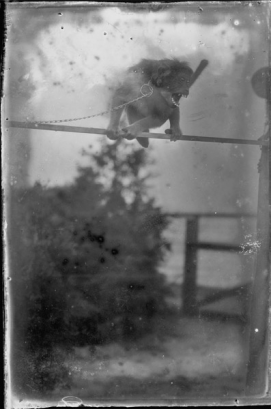
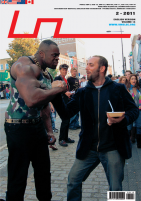




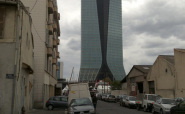
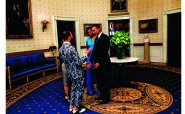
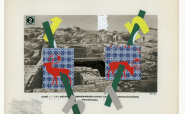
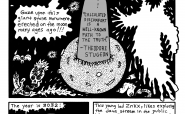
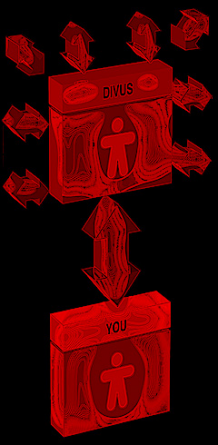






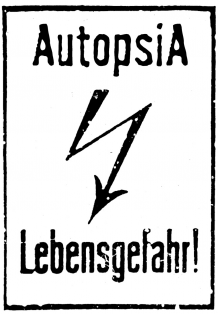




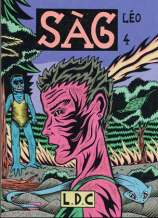
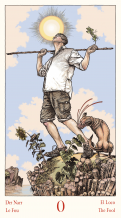
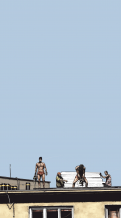



 New book by I.M.Jirous in English at our online bookshop.
New book by I.M.Jirous in English at our online bookshop.
Comments
There are currently no comments.Add new comment